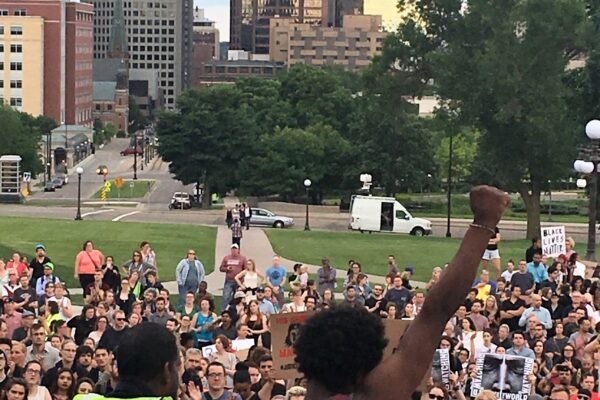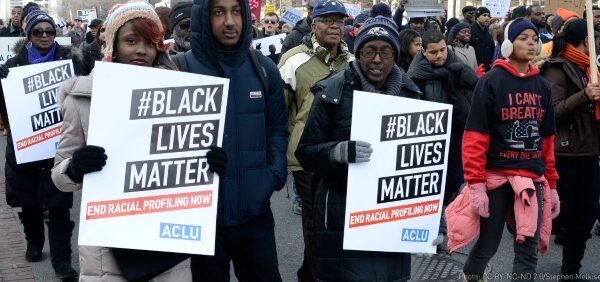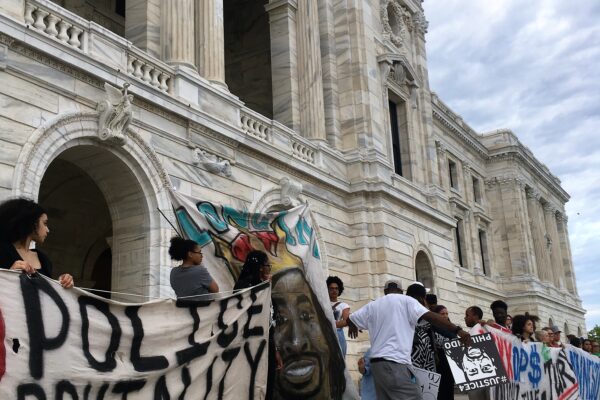ACLU of Minnesota summer intern Moises Roman was born in Mexico and came to the United States at age five, where he was raised on the East Side of Saint Paul. He graduated from Harding High School and is a rising junior at Williams College, studying political science and English. This is his reflection following the Jeronimo Yanez verdict in June.
Only a few weeks ago, I stood outside the Minnesota State Capitol with about 2,000 other people to protest the acquittal of Jeronimo Yanez, the St. Anthony police officer who fatally shot Philando Castile. Today marks one year since Philando’s death. The trial elicited national attention after Diamond Reynolds, Philando’s girlfriend, live-streamed the aftermath of the shooting while her four-year-old daughter cried in the back seat.
At the protest, the glistening white marble exterior of the Capitol posed a stark contrast to the people of color grieving beside Philando’s family. Here I was again, witnessing another black body fall at the hands of the government. It was as if I had been here many times before.
Five hours before the protest, I was sitting at a small coffee shop in downtown Saint Paul frantically refreshing the feed for #Yaneztrial. As I waited for the verdict, my copy of One Hundred Years of Solitude sat alongside my cup of watered-down black coffee. Only after closing my eyes and refreshing the feed once more, could I read the words--the two words so potent my mind lost itself inside them, leaving me in a pit of despair and confusion: “Not Guilty.” Sitting there, reading those two words, I was frustrated by how many other times I had read them.
The killing of black and brown people, and the claiming of innocence for those that kill them, is consistent throughout U.S. history. For example: in the 1700s, when white plantation owners killed slaves without regard to their humanity; in the 1900s, when the trial for Emmett Till ended with no conviction; and the 2000s, when Michael Brown’s murderer was also set free. That day, when the verdict was released, I feared I would be reading the same verdict many times in the future.
Still frozen in my seat, I forced myself to remember Philando’s family. Philando shouldn’t be abstracted and reduced to yet another statistic. He is not Emmett Till nor Michael Brown. He is Philando Castile: a brother, a friend, and a son. To one of my friends he was cousin, to another he was a co-worker. To me he was Philando, someone I crossed paths with time and time again during the strange transition period Arlington high school became Washington. His demeanor was always bright and welcoming, constantly showing his care for us, and I felt desperate to show my care for him.
I attempted to spring myself up from the wooden seat, but struggled to remain standing. My strength was spent on trying not to show my desperation inside the coffee shop. Around me, life seemed to move as usual. I didn’t know what to do or how to show my support, but an urge to see the family at the courthouse grew inside me. I quickly reached for the door and started running the seven blocks. Sweat ran down the side of my face as I approached the courthouse and the rows of cameras. I paused for a moment, wondering what on earth was I doing there? What would I even say if I got the chance to talk to his family? But as they walked out of the courthouse and into the line of cameras, I realized I alone could do nothing. The family was in pain and I could not stop it. The system served them injustice and I wasn't the one that delivered it.
The only immediate thing I could think of doing was to show my support through protest. So I joined the 2,000 other people at the Capitol who also refused to stand silent in the face of injustice. Before the march, I had the privilege of staying silent, but there I realized that the injustices of yesterday will remain the injustices of tomorrow, and the injustices towards my immigrant identity are not separate from police violence. And in this headspace of my convoluted sense of time, this quote by William Faulkner stood out to me, “The past is never dead. It’s not even the past.” The legacy of U.S. atrocities haunts our current systems and will take time to change. But, for now, I will keep my memory of Philando in my shirt pocket, next to my heart, so passion for change is never far from the remembrance of the past.





